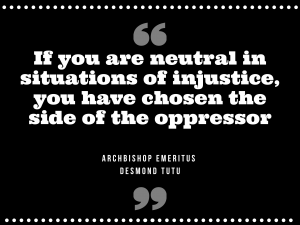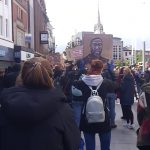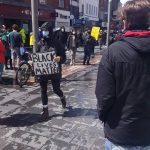| Anglican lectionary: Catholic lectionary: | 1st Reading Gen 21:8-21 Jer 20:10-13 | Psalm 86:1-10,16-18 – | 2nd Reading Rom 6:1b-11 Rom 5:12-15 | Gospel Matt 10:24-39 both |
by Rebecca Boardman, USPG (United Society Partners in the Gospel), Regional Manager for East Asia, Oceania and Europe
NOTES ON THE READINGS
Old Testament
This passage continues the story of Hagar, Sarah, Abraham and their two sons Ishmael and Isaac. The first son, Ishmael was born to Abraham by Hagar – an Egyptian slave, who is instructed to conceive a child for Abraham and Sarah due to their doubt in God’s promise that they would be the Father and Mother of nations. The second son– Isaac – was the fulfilment of this promise- a gift from God whereby Sarah conceived a child in her old age.
During the celebration of Isaac’s weaning we read of Sarah’s jealousy from observing her son Isaac with Ishmael (and maybe memories of humiliation and disgrace from memories of being childless for so long) which results in Sarah instructing Hagar and Ishmael to be cast out. Vs 10 reads “Cast out this slave woman with her son; for the son of this slave woman shall not inherit along with my son Isaac.”
As Hagar is wondering in Desert of Beersheba without water she calls out to God. God hears and the angel of God tells her “Do not be afraid, for God has heard the boy crying as he lies there”. God hears the cry of those abandoned hears as we call out at injustice, unfairness or in helplessness. It is the voice of the boy that God responds to. How does this relate to the voices of people across our planet calling out injustice: demanding leaders take action; striking in the Fridays for Future movement, joining Black Lives Matter marches?
In our modern day understanding this is a horrendous passage of injustice. I wonder what aspects of our society today future generations will find equally unjust and horrifying?
Psalm
Psalm 86 is entitled a “Prayer of David” it is not believed to have been written for a particular occasion but for use during difficult days. It is a beautiful Psalm of ‘supplication for help against enemies’. As a prayer it is similar to the Lord’s Prayer in being a model prayer including thanksgiving, petition and adoration.
Epistle
In the Chapter preceding this we read that the gift of God’s abundant provision of grace, through Jesus Christ, is an answer to human sin. In this chapter Paul is responding to his audience, answering the question of whether to increase the provision of grace people should just keep on sinning? In answering “By no means!” Paul explains that in our baptism we receive an instruction/plea to be ‘dead to sin and alive to God in Jesus Christ’. What parts of our individual/corporate lives really need to ‘die’ in order for us to be more ‘fully alive in Christ’. In what ways can we help one another in this?
Gospel
The gospel reading provides a model of discipleship followed by both an encouragement and a warning to Jesus’ disciples who have just received the ‘limited commission’ to preach the good news of the kingdom to the people of Israel. The passage speaks to the commitment of the disciples.
At the beginning of the passage (vs 24-25) we read a clear principle of discipleship – that the disciple is to become like the teacher – or in other words the goal for the disciples of Jesus Christ are to become as much like Jesus as possible.
Vs 26-28 The disciples are called not to fear, commanding them to speak boldly and publically (in a manner more open than Jesus’ ministry).
Vs 29-33 The disciples are encouraged and reminded about the power and sovereignty of God about how loved and valuable they are in the eyes of God (note: often vs29-31 are used in an anthropocentric way that validates that humans are more important than birds like Sparrows. It is important to consider the broader framing of this that shows God’s deep cares and concern for the sparrows, knowing and being with each one as they fall to the ground).
Vs 34-39 Jesus describes the ministry as one “not of peace, but a sword”. The disciples are warned that their mission is a difficult one. That like a sword it can create division. This is a challenging text and challenging task that requires integrity and truth-telling of the disciples to be put above their family relationships. And that like Jesus they should be prepared for humiliation, rejection and hardship.
DRAFT SERMON/SERMON OUTLINE
Sarah had been the recipient of a wonderful gift from God. God had promised Abraham and Sarah that they would be the founders of a mighty nation. In spite of Sarah’s disbelieve, the conception of Isaac in their old age was the fulfilment of God’s promise to them.
By the time of the celebration of Isaac’s weaning – in today’s passage – we read about Sarah’s jealousy and fear of competition from Isaac’s brother Ishmael. She becomes defensive and does all she can to protect and control what she has. It is almost as if Sarah has forgotten the gifts that she has been given are of and from God.
Sarah – in her position of privilege – casts out Hagar and Ishmael to remove the threat that she believes that they pose her son. She does this knowing the hardship that will come upon Hagar.
For many of us our worlds are highly competitive. Our systems of consumption and a never ending desire for profit enables the few people who benefit to accumulate and protect their wealth at a huge cost to the majority of people and the planet. The climate and ecological crisis is a result of this.
Another example comes from this time of Covid-19. During the pandemic pre-existing structural inequalities have been exacerbated as billionaires have been getting richer whilst millions of families face unemployment, loss of health care benefits and food insecurity.
When do we, in wanting to protect what we have, do all that we can to keep our position of privilege no matter what the cost to other people or the planet? How easy is it for us to forget that the gifts that we have are not ours but come from God?
This question also speaks into the Black Lives Matter movement. Over the past two weeks’ streets across the USA and some other cities around the world have been filled with Black Lives Matter marches, protests and demonstrations calling out systematic racism and how ideas of white supremacy are captured across society, dominating and oppressing. The need to be anti-racist and challenge inherited privilege if we are ever to achieve justice have come to the fore.
Our further readings give us an idea of how to respond.
- Prayer –The injustice and brokenness of our world means that we are living in difficult days. Let us share in David’s prayer in Psalm 86. As a prayer it is similar to the Lord’s Prayer in being a model prayer including thanksgiving, petition and adoration – what other parallels do you see between the two prayers?
- Personal reflection, education and growth – in Romans 6 we read about the new life that we have in Christ. That we are to turn to Jesus, perfect in justice and love, and are set free from sin. How can we educate ourselves about the ways in which out privilege oppresses others? Acknowledging our transgressions is the first step in repenting and moving forward to a just and loving world modelled on Jesus Christ.
- Bold action embedded in integrity – as the disciples are warned that to live a life of Christ inspired integrity is hard. It will create divisions and they have to be aware of this even within their families. There may be ridicule, there may be humiliation. And yet we are not to fear.
- What does action with integrity look like in your community?
- How can you challenge systematic injustices with boldness?
- Make a pledge for action in the coming week
ADDITIONAL MATERIAL
Examples of Anglican Churches standing in solidarity with Black Lives Matter:
The Anglican Church of Southern Africa: https://www.episcopalnewsservice.org/2020/06/08/south-africa-religious-leaders-hold-black-lives-matter-prayer-vigils/
Diocese of Brasilia, Brazil: https://uspglive.org.uk/wpress/2020/06/black-lives-matter-a-statement-from-the-anglican-diocese-of-brasilia-brazil/?fbclid=IwAR2CO2Ho3LlmVIKmDL-KKpqq1eIdKb1q0PSzm4do3FNScJUGrIzmrQBoQgM
Anglican Communion Summary: https://www.episcopalnewsservice.org/2020/06/05/across-the-anglican-communion-leaders-speak-out-on-racial-justice-and-defend-protesters/
by Rebecca Boardman, USPG, UK
Photos from the Black Lives Matter march, Leicester, UK:
 (images © Farah Ghouri)
(images © Farah Ghouri)
 Erasmus+ – project
Erasmus+ – project